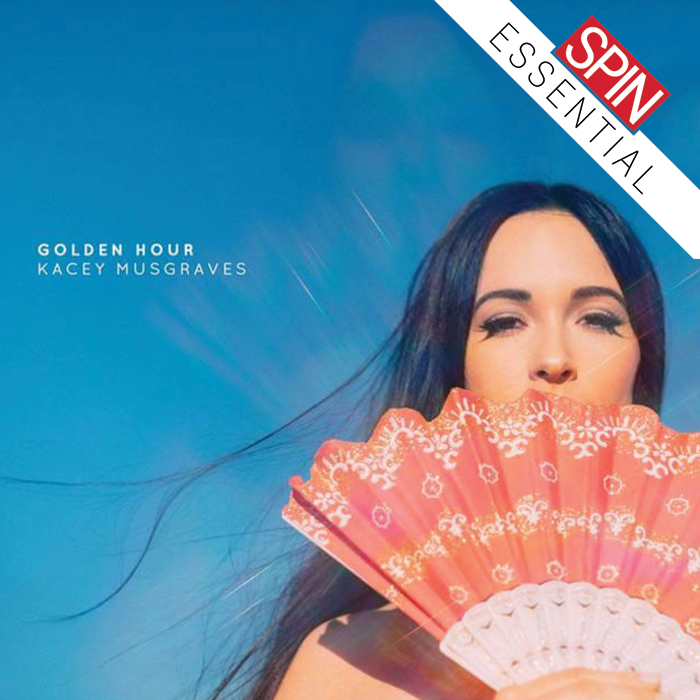The title track of Pageant Material, Kacey Musgraves’ last album, is among her subtler wordplays. “I ain’t pageant material,” she sings: bad with high heels, iffy on swimsuit competitions. But it’s also a nod to the fact that women in country tend to produce pageant material, as in repertoire; conservative songs for big voices that might be sung, alongside “Broken Wing” maybe, by Junior Misses across the heartland.
That’s never quite been Kacey, who since acerbic debut single “Merry Go Round” has occupied an uneasy place in the country industry. She’s a woman in a genre where radio consultant Keith Hill drew criticism in 2015 for advising programmers that “if you want to make ratings in country radio, take females out.” She doesn’t quite fit the standard archetypes for women in country: not a Southern belle like countless ingenues, not a brash spitfire like Miranda Lambert, not a maternal elder like Dolly or Reba. And she sings about such un-conservative topics as gay rights and marijuana—topics that are not without recent precedent, or even precedent decades ago, but like most of the world, the Nashville industry finds such outspokenness more pardonable in men.
Where Same Trailer, Different Park and Pageant Material were largely written with Luke Laird and Shane McAnally, with hundreds of country credits between them, Golden Hour is written with Daniel Tashian, of alt-country group Silver Seas, and Ian Fitchuk. The difference is palpable from track one. Kin in melody and wistfulness (and title) to the Civil Wars-penned “Slow Disco” from St. Vincent’s last album, “Slow Burn” is essentially Musgraves’ re-introduction: incorporating lines from one of her earliest tracks, “Burn One With John Prine” (“grandma cried when I pierced my nose”). The chorus drifts along quietly, unlike much of country radio’s weapons-grade Southern rock choruses; the lyrics are plainspoken, with none of the neat packaging (“tying everything up in a bow,” she called it) of her old work. Where she once had a compelling songwriting portfolio, here she has a compelling mood.
That mood’s best described as “content.” Musgraves just got married, which accounts for the uptick in love songs. But there’s a low-key contentedness to everything else, too, less akin to rootsy country than bedroom indie-pop. Musgraves’ voice, high and earnest, is reminiscent of folkies like Suzanne Vega or Sheryl Crow (at whose house Golden Hour was recorded). It’s not a belting voice, but it’s a remarkable instrument, capable of imbuing with winsome empathy songs like “Lonely Weekend” and “Happy & Sad” that might otherwise be tweenish sap. Even the druggy tracks approach Disney levels of earnestness: “Mother,” perhaps the most wholesome track ever written on LSD, and the ethereal, vocoded “Oh, What a World,” which is like a rewrite of “What a Wonderful World” by someone who prefers a different sort of trees of green.
The buzziest track on Golden Hour is undoubtedly “High Horse,” which gallops along with a Shania Twain conceit and lite disco licks that sound more like pop-radio Pharrell than what one might think of as country. Then again, in 2016, Pharrell cut a record with Musgraves’s current tour mates Little Big Town. And for a couple of years now, middle-of-the-road country music has quietly come to sound a lot like radio pop circa the ‘90s, the kind that perhaps wouldn’t be classified as country if released then. Pick a country single off the charts; it’s as likely to sound like Southern rock as Fleetwood Mac or Lilith Fair or even Hanson. The genre’s being blurred from the other direction as well—recording a country-adjacent album is the go-to of late for pop stars wanting to rebrand as “authentic,” from Lady Gaga and Miley Cyrus’s Joanne and Younger Now to Kesha’s Rainbow (“Godzilla” and “Spaceship” could be alternate-universe Musgraves tracks).
Little surprise, then, that Golden Hour falters where it’s closest to mainstream country. “Space Cowboy” is the sort of track where you suspect the writers came up with the titular concept first (“you can have your space, cowboy”) then paired it with a stock arrangement. But then there’s something like “Velvet Elvis,” co-written with Nashville longtimer Natalie Hemby. It’s a chameleon of a song, and it’s easy to imagine it sung brash, by a Miranda Lambert or Kellie Pickler type. Musgraves’s version is more understated, from its floaty “Every Breath You Take” riff to her near-deadpan vocal. “All I ever wanted was something classic,” she sings, echoing a diss in “High Horse,” whose subject is “classic in the wrong way.” If the right way’s a hunk of velvet kitsch, Musgraves sings, what’s the problem? And if the right way for Musgraves’s music is low-key folk, what’s the problem? It’s not classicist, but perhaps it might be classic.
Read our March cover story: How Kacey Musgraves Found Her Golden Hour.





